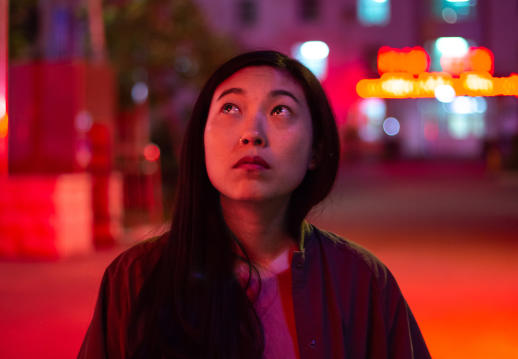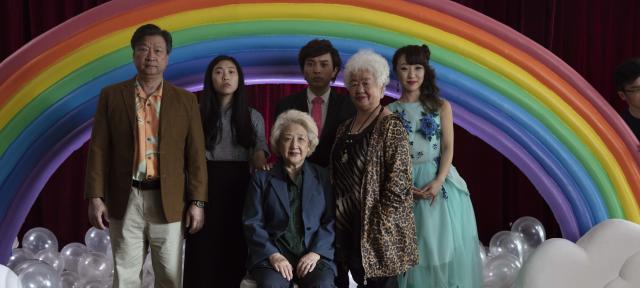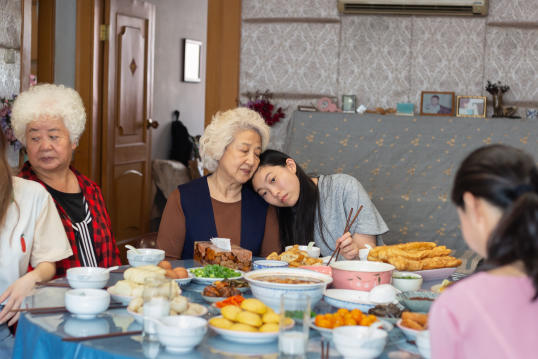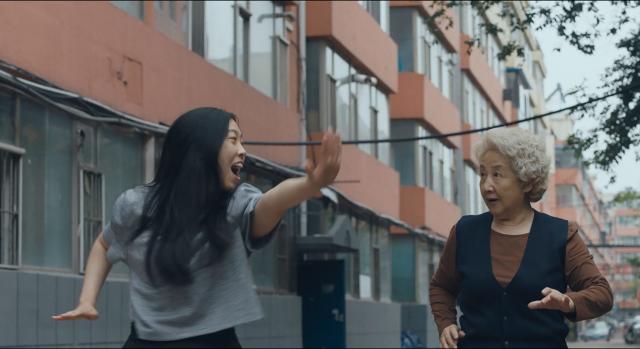Lulu Wang On ‘The Farewell’s Cultural Impact & Making Films That “Challenge Traditional Boxes”

Click here to read the full article.
When Lulu Wang’s The Farewell debuted at Sundance, it immediately became the talk of Hollywood. The dramedy based on Wang’s own story about her family keeping her grandmother’s cancer diagnosis a secret goes beyond family issues. It’s also an immigration story that explores cultural identity through Awkwafina’s character, Billi. The Farewell has received numerous accolades, but for Wang, she is just happy with sharing her story with the world. Deadline talked to her about the impact of the film, Hollywood’s perception of foreign films and how she hopes to continue to advocate for underrepresented voices.
DEADLINE: The film has certainly struck a chord with the Asian American community, but how has the response been outside of it?
More from Deadline

LULU WANG: It’s been really great. I’ve traveled in Europe, where a lot of the international releases are starting to roll out, and it’s been really interesting to see, because having made a film that so many people didn’t want to make and felt was going to be super niche, to see it travel to all of these countries that I’ve never been to before, and have it resonate with audiences so deeply has been very enlightening.
DEADLINE: The Farewell has played globally, but has there been a common reaction to the film? Or is it different depending where you are in the world?
WANG: I think a lot of the themes in the film are from the perspective of somebody whose family is Chinese, and who has then immigrated to America. But traveling with this film makes me realize that so many people have the same exact experience—even if the place they come from and the place they live are different.
DEADLINE: How has your family responded since its release and has it changed the dynamic?
WANG: My family responded really well. I mean, they’ve really come to terms with it. I think in the beginning it took some adjustment on multiple levels, having such a personal family story out in the world.

Also, for my parents to see my career and my life completely change because of this one project —I think that they are really proud. I think that they’ve just become more used to the fact that the story is out in the world. I think it changed the dynamic because the secret was within our family. They felt more okay about keeping a secret. But now that the whole world knows, I think that some members of my family feel less okay about keeping the secret from my grandma.
DEADLINE: Awkwafina won a Gotham Award for her role in the film and Zhao Shuzhen was nominated for an Indie Spirit Award. The film has become a strong awards contender since its Sundance debut in January. What do all these nominations and buzz mean to you as a filmmaker?
WANG: It’s been a pretty long journey with this film since January, so to still be part of this conversation is incredible. It’s very humbling and very unexpected. I think that, for me, just the fact that the film is still part of the conversation, in many ways, means we’ve already won.
So many people have come up to me and said, “Because of your film, it inspired me to tell my family story.” Many producers have gone up to my producer and said, “We want to make the next The Farewell.” So, for me, that’s really the win. The way A24 positioned it and the fact that it’s part of of the cultural conversation in America as an American film—that was something that was very important to me. I don’t know what else I could possibly ask for. I feel like I have a lot of opportunities to really tell stories from my own lens and not be boxed in, and I just hope that the success of the film enables other filmmakers to do the same.
DEADLINE: How do you think The Farewell would have played if it were released 10 years ago?
WANG: It’s hard to imagine, because so much of life is about the right thing at the right time. First of all, I would not have been able to make that the film 10 years ago because of one, age. Getting older and having more experience, and also the state of the world contributed to the fight that I fought to tell the story. So I certainly would not have been able to make this film 10 years ago, but I also think that the world was probably not ready. I think that the political climate, everything that’s happening in the world, has forced us to look at things differently than we have in the past.
DEADLINE: Nigeria’s Lionheart was disqualified as an international film Academy entry because it’s in English. The Farewell is an American film, but mostly in Mandarin. What’s your stance on this?

WANG: I think it’s a really interesting year. The Farewell is an American film that happened to be in a foreign language and the Nigerian film Lionheart is a foreign film that’s in English. And so it makes you question, well what does it mean to be American? What does it mean to be foreign? If you speak English because your country was colonized, then are you not foreign? I’m optimistic in a way now about it, because I think if you look at the big picture, it’s a really great dilemma to have because it means that films are being made that challenge the boxes.
That challenges rules for different awards ceremonies. In the Golden Globes, we’re considered a foreign language film. Now, technically that’s true. We are a foreign language film. They’re not calling it an international film or a foreign film. They’re saying it’s in a foreign language — but it just means that you’re then in a category with non-Americans. So The Farewell was in the category with a French film and Bong Joon-ho’s Parasite, which is Korean. But in many ways, I think that I’m closer identity-wise to maybe Scorsese who makes films about the Italian-American experience and the immigrant experience, which is what I’m doing. It’s what The Farewell is. It’s about being an immigrant, being a hyphenate.
To not be recognized that way is problematic. I think that a lot of these organizations are not prepared for it, because when the films are not made that challenge these rules, then you can’t have a conversation about it.
I actually respect the rules of the Academy, because traditionally the rules around foreign and the international films were made to recognize films that might not otherwise be recognized. Films that are in a foreign language exclude Australia and the U.K., right? So I actually understand why they took this approach to make this set of rules—but then here comes a film that challenges that.
I just think things are not going to change immediately, and it may not work in our favor this year. I think that if you’re part of a movement that challenges these traditional boxes, then that’s what’s important.
DEADLINE: Being a filmmaker in the spotlight, do you feel a responsibility to advocate for storytellers who have always been in the margins—specifically, Asians and women of color?
WANG: Yeah, absolutely. What I’ve learned from this experience is, look, I’m not special. I had a great opportunity and a lot of things had to come together for the film to be made, and for it to be released in the way that it was released. A lot of different people, a lot of support—and what it made me realize is, one, just how hungry we all are for different perspectives. And two, how important that is. I always talk about how Neil Drumming from This American Life approached me at a film festival and said, “I really liked your short film and I want to know what other stories you want to tell. What are the stories that you want to tell that Hollywood is not letting you tell? Because I’m about to start this job with This American Life and you should bring those stories to me.” A question that’s that simple can be so incredibly empowering and life-changing when you haven’t been asked that question before.

I think that we often talk about filmmakers and storytellers and we worship talent; we worship the tortured genius. There are certain people who have the privilege to be a tortured genius and there are other people who don’t even feel entitled to have a voice to tell a story or to feel worthwhile. Their stories are worth it and are worthwhile but does anybody want to hear them? When I wrote the script, my father said, “Yeah, it’s really authentic to what happened, but why does anyone care? Why would anybody care?” and he was very worried about me.
I guess he thought, if you’re trying to tell a story that no one’s going to care about, how are you going to make a living? And in a way, he almost said I was delusional, [even when] I had a production company run by non-Asian people who were backing me financially.
If somebody is actually going to pay you to do the thing—to write the script, to direct the film—then that’s a validation. But so many of us don’t have, one, the financial support, the financial ability from our family, to just go and make art. Also, I didn’t grow up with the confidence that our voices matter. So for me, that question of Neil says, “Hey, what are the stories you want to tell? And by the way, we can pay you to tell them.”
DEADLINE: How do you hope to “let the ladder down”, so to speak?
WANG: That’s the way I think going forward. I’m doing a couple of TV series where I’m showrunning and I have features where I’m bringing up other talent. You can’t look at the same list that has been circulating, and it isn’t just about ticking off boxes in order to meet diversity. You really could say, “What’s a perspective that is absolutely needed?” without trying to click the diversity box, but to actually have that perspective to teach me something and show me a side of the world that I haven’t seen and considered before.
DEADLINE: Seeing as though Hollywood is a space primarily occupied and run by heterosexual, cisgender, able-bodied males, do you ever suffer from imposter syndrome? If so, how do you navigate that?
WANG: There’s times when I feel it, and there’s not much I can really do about it except to keep working, honestly. I think everyone suffers from it, to a degree. But yeah, oftentimes I feel like an outsider. I worry about being pigeon-holed. As opposed to being seen as a director, as opposed to being seen and asked questions about craft, you’re the token Asian, you’re the token person of color, you’re the token woman—whatever that is. I think at the end of the day you realize, or at least I have to realize, that you can’t really control how people see you. You can’t really control perception, except to your work. If I feel like I’m trapped in a box, the only way I’m going to get out of that box is if I continue to make work that challenges perception.
Best of Deadline
Stan Lee's Legacy: Ranking The Hollywood Heroes Co-Created By The Marvel Comics Icon
Disney-Fox Deal: How It Ranks Among Biggest All-Time Media Mergers
Sign up for Deadline's Newsletter. For the latest news, follow us on Facebook, Twitter, and Instagram.

